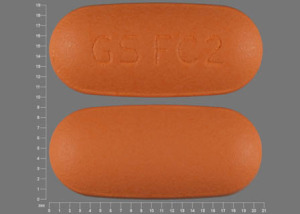Epzicom and Alcohol/Food Interactions
There are 4 alcohol/food/lifestyle interactions with Epzicom (abacavir / lamivudine).
Alcohol (Ethanol) Abacavir
Minor Drug Interaction
Information for this minor interaction is available on the professional version.
Switch to professional interaction data
Lamivudine High Cholesterol (Hyperlipoproteinemia, Hypertriglyceridemia, Sitosterolemia)
Major Potential Hazard, Moderate plausibility
NRTIs - pancreatitis
The nucleoside reverse transcriptase inhibitors, didanosine, stavudine, and lamivudine, may cause pancreatitis. The incidence is generally low but is up to 7% with didanosine, and up to 18% in pediatric patients given lamivudine. Patients with a history of or known risk factors for pancreatitis (such as alcohol abuse or hypertriglyceridemia) should be monitored closely during therapy with these agents. Therapy should be discontinued at the first signs/symptoms suggestive of pancreatitis (e.g., nausea, vomiting, abdominal pain, hyperamylasemia with dysglycemia, rising triglycerides, decreasing serum calcium), and preferably permanently discontinued if clinical pancreatitis develops.
Abacavir High Blood Pressure (Hypertension)
Moderate Potential Hazard, Moderate plausibility
abacavir - cardiovascular disease
Some clinical trials have reported increased risk of myocardial infarction in patients treated with abacavir. Although some of the findings are inconclusive, as a precaution, the underlying risk of coronary heart disease should be assessed before therapy, and action should be taken to minimize all modifiable risk factors such as hypertension, hyperlipidemia, diabetes mellitus, smoking, etc.
Abacavir High Cholesterol (Hyperlipoproteinemia, Hypertriglyceridemia, Sitosterolemia)
Moderate Potential Hazard, Moderate plausibility
abacavir - cardiovascular disease
Some clinical trials have reported increased risk of myocardial infarction in patients treated with abacavir. Although some of the findings are inconclusive, as a precaution, the underlying risk of coronary heart disease should be assessed before therapy, and action should be taken to minimize all modifiable risk factors such as hypertension, hyperlipidemia, diabetes mellitus, smoking, etc.
Switch to professional interaction data
Epzicom drug interactions
There are 63 drug interactions with Epzicom (abacavir / lamivudine).
Epzicom disease interactions
There are 5 disease interactions with Epzicom (abacavir / lamivudine) which include:
More about Epzicom (abacavir / lamivudine)
- Epzicom consumer information
- Check interactions
- Compare alternatives
- Pricing & coupons
- Reviews (6)
- Drug images
- Side effects
- Dosage information
- During pregnancy
- FDA approval history
- Drug class: antiviral combinations
- En español
Related treatment guides
Drug Interaction Classification
| Highly clinically significant. Avoid combinations; the risk of the interaction outweighs the benefit. | |
| Moderately clinically significant. Usually avoid combinations; use it only under special circumstances. | |
| Minimally clinically significant. Minimize risk; assess risk and consider an alternative drug, take steps to circumvent the interaction risk and/or institute a monitoring plan. | |
| No interaction information available. |
See also:
Further information
Always consult your healthcare provider to ensure the information displayed on this page applies to your personal circumstances.


